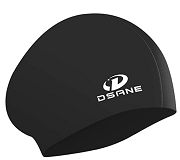No wonder Amazon is eating their lunch
Our local pool finally reopened recently, so I'm making one of my periodic attempts to get back into swimming. I have long hair, and the last time I went, I thought, you know, I should get a swim cap.
I researched and learned that there is such a thing as a cap for long hair (i.e. fits over a bun, I guess). So yesterday, Sunday, I betook myself to the local shopping center to go to the sports store. I'm always hesitant about the place because they seem to be, as we say at our house, run by children: the average age of the sparse staff seems to be in the low 20s or thereabouts. But it was local and open.
 I found the section for swim caps. They had no long-hair swim caps at all, but they did have a normal silicone cap that I thought might do. In fact, they had two identical packages of them. One was priced at $12.99. The other was priced at $9.99.
I found the section for swim caps. They had no long-hair swim caps at all, but they did have a normal silicone cap that I thought might do. In fact, they had two identical packages of them. One was priced at $12.99. The other was priced at $9.99.
I found someone who was working there and asked, "Do these seem different to you somehow?" No. So it was odd that they were priced differently, right? "Let me look that up," the employee said, and went to the register to scan the two packages. After the scan, the employee said that yeah, the price was $12.99. Did I want to buy it?
Dear reader, I now ask you to contemplate whether this could have been an opportunity for a customer-service win.
But the opportunity was not seized. Even though I was holding a package in my hand that was clearly labeled $9.99, they were going to charge me $12.99. And it wasn't even exactly what I was looking for.
I went home and ordered what I needed from Amazon. It was less than $9.99 and it was on my doorstep by 9:30 Monday morning.
Now, I can imagine that some employee had been tasked at some point with updating price tags and had just missed this item. And I can imagine that the employee I talked to was not authorized—in fact, perhaps no employee at the store is—to override the price that the computer lists for an item.
I could have sucked it up and paid the extra three dollars for an item that wasn't quite what I wanted. And I could have felt virtuous doing so knowing that I was "supporting local business," although it turns out that this company has over 400 stores spread around the western states.
This is the dilemma of retail businesses. They can't compete directly with online sources on price or selection. But they have to offer something that makes up for this besides simply being local. Good customer service is a possibility. Knowledgeable staff. The instant gratification of walking out of the store with what you went there for.
There's a local hardware store with 7 outlets in the Seattle area that does this right. They compete with Home Depot and Lowe's (often close by), but they are generously staffed with people who know what they're talking about. Most of the stores are big, and although they don't stock as much as a Home Depot, they stock some of the weirder things you might need, and as noted, they have people who can help you find that thing and can then tell you how to use/install/fix/wire/paint it. I will always go to this store first, and I am willing to pay the "local" price, which is often 10–20% higher than what the box stores charge.
So "shop local" can be a good experience. But, as my sports-store experience suggested to me, local is not by itself enough to compete.
What are your thoughts?